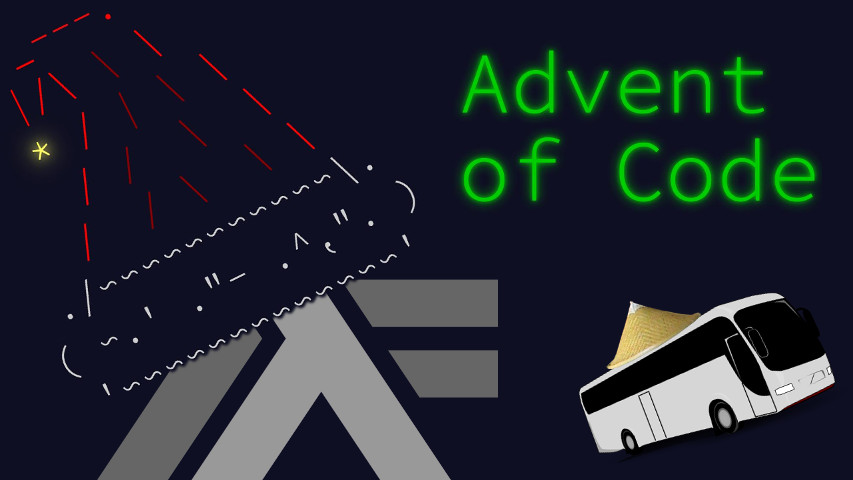Various grades of modular arithmetic for today’s puzzle. Let’s start with the obligatory literate Haskell header.
{-# LANGUAGE NamedFieldPuns #-}
{-# LANGUAGE RecordWildCards #-}
{-# LANGUAGE TupleSections #-}
import Control.Arrow
import Data.Function
import Data.List
import Data.Maybe
import Data.Ord
import Text.ReadThe puzzle input is a starting time and a list of bus IDs presented in an unusual manner.
data Puzzle = Puzzle
{ earliest :: Int
, busIds :: [Maybe Int]
}With Ints being used both as timestamps and bus IDs, I’d
typically newtype them to avoid using one for the other by
accident. But the bus IDs double as a time period. Tough luck, it’s all
staying undistinguished Ints and I’ll just have to be
careful.
I’ll parse the CSV with break and
unfoldr.
parseInput :: String -> Puzzle
parseInput input = Puzzle
{ earliest = read start
, busIds = unfoldr go schedule
}
where
[start,schedule] = lines input
go "" = Nothing
go s = Just $ readMaybe *** drop 1 $ break (== ',') sPart 1 asks for the first bus to depart the airport after my plane lands. The natural thing to do can’t be beaten: check all busses for the time to wait before their next departure.
earliestBus :: Puzzle -> (Int,Int)
earliestBus Puzzle{..} =
catMaybes busIds &
map (id &&& timeToNextDeparture earliest) &
minimumBy (comparing snd)How do I compute the time to wait before a specific bus next departs? Modular arithmetic!
Bus number m departs every m minutes. departure ≡ 0 ( mod m)
The wait time is the time between the plane’s arrival and the bus’s departure. wait = departure − arrival
Therefore, for a wait time between 0 and m − 1: wait ≡ − arrival ( mod m)
timeToNextDeparture :: Int -> Int -> Int
timeToNextDeparture arrival period = negate arrival `mod` periodIn part 2, we are to find which arrival time would generate a wait time for each bus ID equal tp its position in the input list.
That’s a direct application of the Chinese Remainder Theorem. When I need it I usually just copy-paste the algorithm from Wikipedia or other source, but it so happens I actually understood it this time, so I’ll detail a bit more.
The theorem in itself just states a solution exists for some conditions on the chosen moduli, “all being distinct primes” being a strict subset.1
The interesting part is generating a solution. The idea is a close parallel to Lagrange’s interpolation polynomials: we’ll use a linear basis among the moduli. In other words, we’ll generate a solution as a linear combination of numbers whose residue is 1 with regard to a specific modulus and 0 for all others.
How is such a number found? It’s 0 for all moduli but one by virtue of being a multiple of their product. We want it to be 1 for the chosen special modulus. That modulus and the product of all others are coprime, so we can use Bézout’s theorem to solve for it: ∃(u,v) ∈ ℤ2, uΠi + vmi = 1
u and v are the result of the extended Euclid’s algorithm.
egcd :: Int -> Int -> (Int,Int)
egcd 1 0 = (1,0)
egcd _ 0 = error "egcd: Not coprime"
egcd a b = let (u,v) = egcd b (a `mod` b)
in (v,u-a `div` b * v)The construction for the CRT’s solution then follows. (Note how I don’t care about the Bézout coefficient for the product of all “other” moduli.)
chinese :: [(Int,Int)] -> Int
chinese divRems = x `mod` π where
(divisors,remainders) = unzip divRems
π = product divisors
factors = map unitFor divisors
unitFor m = snd (egcd m π_i) * π_i where π_i = π `div` m
x = sum (zipWith (*) remainders factors)The rest is a matter of mapping the input to fit.
earliestArrival :: Puzzle -> Int
earliestArrival Puzzle{busIds} =
chinese $ catMaybes $
zipWith (\bus wait -> (,negate wait) <$> bus) busIds [0..]The main wrapper for completeness.
main :: IO ()
main = do
input <- parseInput <$> readFile "day13.in"
print $ uncurry (*) $ earliestBus input
print $ earliestArrival inputThis concludes today’s solution. See you soon!
It’s the case for mine, and probably yours too.↩︎



